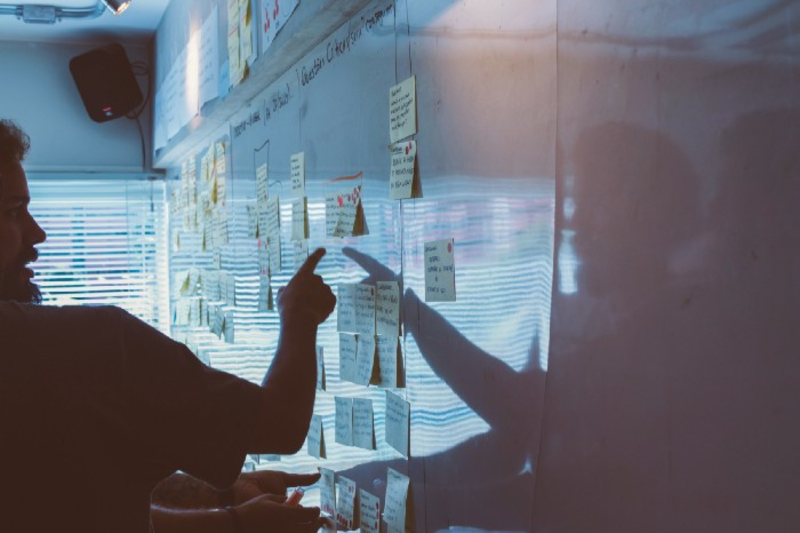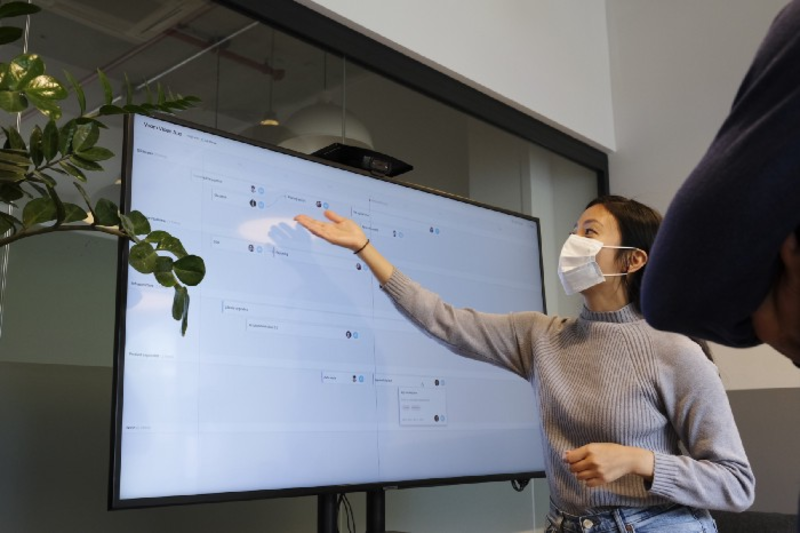How to Land a Senior Data Scientist Position
How to differentiate yourself as a senior in data science interviews.

Image by Editor
You’ve been working in the data science industry for a few years now, and you are ready to move beyond an entry-level position. The only problem is you are not sure how. How do you land a senior data scientist position?
In this blog, we are going to answer that question. If you would rather get this information in a video, I also have a video on the subject on my YouTube channel. Both discuss the base requirements many companies use to determine junior versus senior data scientists and then move on to how you can make yourself stand out in an interview as someone qualified for a senior position.
Before we dive into this though, I want to put out a small disclaimer. I was not a senior data scientist. When I worked at my previous company, Airbnb, I transitioned from data science to software engineering, so I was never in a senior data scientist position. However, I have gained knowledge about what differentiates junior and senior data scientists from my colleagues by interviewing senior data scientists.
Okay, now let’s get started!
The Difference between a Senior and Junior Data Scientist
First of all, when it comes to interviewing for senior versus entry-level positions the process may not look too different. In many companies, the interview process is the same for entry-level and senior data scientist positions. There are technical rounds, such as statistics, SQL, and coding, and non-technical rounds, such as behavioral interviews. I consider interviews like product case interviews or presentations as a combination of technical and non-technical skills.
If the interview process is the same, how does a company determine whether you are a senior or mid-level? Truthfully companies typically have a standard already in place. While there are outliers, you cannot fake your experience.
To land a senior position often requires around 4 to 5 years of experience if you have a Master’s degree, or 2 to 3 years of experience if you have a Ph.D. That is to say, it may require more than 5 years of experience if you have a bachelor’s degree.
Can You Influence Your Placement in an Interview?
Thus in many ways, seniority is predetermined. However, that does not mean there is nothing you can do to influence your placement and position in a company. I know people who did great in the interview and landed a senior position, even though they only had less than 2 years of experience.
There is also a flip side to this. I know people who did not do well in the interviews and were offered positions that were lower than their experience might dictate. Your experience matters, and so does how you present yourself in the interview.
To answer this question, I’m going to talk about 3 different interview areas where you can showcase that you deserve a more senior position: product case interviews, behavioral interviews, and presentations.
Showcasing Yourself as a Senior: Product Case Interview
The product case interview is one of the first areas in which you have a chance to display skills that could lead to a more senior position. A product case interview is all about your problem-solving skills. While both a senior and entry-level data scientist need to be able to solve problems, someone who deserves a senior position has solutions that stand out.
But how do you make your solutions stand out, right? There are three ways to demonstrate a higher level of problem-solving skills that could help you land a senior position.
Show Awareness of Context
The first way is to consider the specific context of the problem rather than following a framework rigidly. When I say specific context, it includes the business model, the stage of the company, and the unique aspects of a product.
Anyone can memorize a framework and follow it to come up with an answer. Doing that will not prove you have the experience and ability that deserves a more senior position. In fact, if you start with a framework right away after getting a question, it may sound a bit too reactive.
For example, some people consider the natural next step to evaluate any hypothesis is to use a/b testing. However, there are cases when doing an a/b testing is not feasible, such as resource constraints or the requirement of a/b testing is not met.
Imagine that you are asked to select a few ideas among many ideas for an early-stage e-commerce business. We won’t simply a/b test every single idea because it will be costly and time-consuming, more importantly, it’s not necessary. If we have data on users’ preferences, browsing behaviors, and purchase histories, we could gain lots of insights by looking at the data and seeing which part has the most demand and opportunity.
Another example is diagnosing a problem with Robinhood where the trade activity is decreasing. You might follow a framework to go over factors such as seasonality, external events, and user segment. However, if you don’t take the time to clarify things like how much is the change, what kind of activity is decreasing, is it stock or crypto, etc., it becomes clear that you are following a framework without considering the specific context of the exact problem.
Remember that frameworks are generic, while problems are specific. You want to show awareness and understanding of the product itself and the goal of the company. Frameworks are a useful tool, but you also want to demonstrate your capability for individual thinking and coming up with specific solutions.
Demonstrate Advanced Problem-Solving Skills
Another way to show advanced problem-solving skills is by considering potential issues or pitfalls with a question.
For example, Facebook has asked you to improve the accuracy of birthday data. Many candidates would immediately jump into their methods and the data they would use to achieve this. However, a more experienced candidate might first ask things like “Why do we need it?” and “Do we only need the month and date or do we also need the year information?”
An experienced candidate recognizes that there might be privacy issues here that should be taken into account when determining a solution. If you want a senior position, you need to show not only an ability to work with the data but also a competence for understanding potential problems and obstacles.
Use Strategic Thinking
Finally, a senior data scientist shows strategic thinking in a product case interview. What is strategic thinking? To put it simply, it’s the ability to think beyond numbers. When running an experiment the result is important. However, there are many things that need to be considered at the same time.

Photo by Startaê Team on Unsplash
For instance, Uber is testing a new referral program to acquire new drivers. The experiment showed that the program will lose money in the short term. That might make it seem like the program is a bad idea, but the program might still have strategic benefits. Acquiring more drivers results in a better supply to serve the demand, also newly acquired drivers may refer more drivers to the platform. Both may eventually increase Uber’s market share and help keep its competitive advantage.
So a senior data scientist knows how to think beyond numbers. They consider multiple aspects of a problem to determine what best meets the goals of the company. To differentiate yourself as a senior candidate, it’s important to demonstrate an ability to think strategically about the problems at hand.
Showcasing Yourself as a Senior: Behavioral Interview
Now that we’ve looked at the product case interview, let’s examine how you can differentiate yourself in the behavioral interview. The behavioral interview is where you will discuss your past experience, and, as we mentioned in the introduction, you cannot fake experience. Still, how you present your experience can make a difference.
Present Multiple Attributes of Yourself
In behavioral interviews, you will not simply be listing your experience like you would on a resume. You will be asked questions that require you to tell stories about your past, and each question will typically focus on a particular attribute. You will be asked things like “Describe a time you dealt with a conflict” or “Tell me about a time you had to work under a strict deadline”. These questions are looking to examine your conflict resolution and time management skills.
If you want your experience and abilities to stand out, go beyond just the attribute that the question is obviously asking about. Display multiple dimensions of yourself with each answer. Remember that you are not only answering the question but also presenting yourself as a professional and a person.
To land a senior position, you want to show that you possess attributes that would make you a good choice for a higher position. Some positive attributes include leadership, responsibility for the team, and the ability to thrive in ambiguity. Fine-tune your stories to show that you are willing to go above and beyond, care about the overall team success, and can drive and deliver impact.
Be Proactive

Photo by Hunters Race on Unsplash
Besides showing that you have the attributes that would allow you to be successful in a senior position, you also want to show your interests and that you can be proactive. How do you do this? Take the time to prepare good questions for interviewers.
Having good questions to ask at the end of an interview is a chance to show that you can take the lead and drive the conversation rather than simply reacting to questions, which is a necessary skill for someone looking for a senior position. Having good questions also indicates that you have thought extensively about the position and that you are truly interested in it.
Showcasing Yourself as a Senior: Presentations
Now let’s look at one more area where you can differentiate yourself as a senior: presentations. Some companies will ask you to present past projects in an interview. This is an especially good way to evaluate seniority.

Photo by airfocus on Unsplash
An effective data scientist has to be a good presenter. You must be able to convince stakeholders to buy into your ideas. A presentation gives you a chance to show interviewers how you can drive a situation and how convincing you can be.
Present Your Best Stuff
There are a few things to remember to keep your presentation effective. First, present your best stuff, and by that, I mean present something that isn’t too easy. Projects that don’t have any challenges, limitations, or obstacles do not tell an interviewer much about your experience.
Interviewers prefer to hear about a challenging project even with some limitations instead of an easy project that is 100% successful. By presenting on a project with challenges, you can show your skillfulness and adaptability far better than you can when everything goes smoothly.
Highlight Your Impact
Another way to make the most of your presentation is to highlight your impact. Try to focus on “I” instead of “WE”. Clearly explain your contribution to the project in the end-to-end execution of an idea. Being able to drive a project is a strong indicator of experience.
For example, when it’s a big project involving multiple teams, how you collaborate with other professionals, did you provide insights to help the product manager with narrowing down the scope of the work, did you consider implementation feasibility for engineers, etc. Those aspects would be a big plus for senior data scientists.
Accept Feedback Professionally
Finally, be sure to maintain a good and professional attitude towards questions and suggestions. The behavioral interview is not the only part of an interview where your behavior is being evaluated, presentation is also a good way to evaluate that.
As you present, be sure to truly listen to questions and other remarks your audience might make. Companies want data scientists who are willing to listen to other opinions, so even though you might take the lead when presenting, do not forget to be attentive to your audience and whatever requests they may make. Accept questions and feedback openly.
Conclusion
Those are some ways that you can prove that you deserve a senior position in an interview. Still, remember that most companies do have pre-set standards for seniority, so you should not expect to get a senior position if you do not meet these, although it can happen.
Experience differentiates junior and senior data scientists on paper, but there should also be a difference in the way junior and senior handle themselves in an interview. While it is crucial to meet the requirements, presenting yourself well in the interview is also important if you want to land the job.
Emma Ding is Founder & Career Coach at Data Interview Pro.
Original. Reposted with permission.
